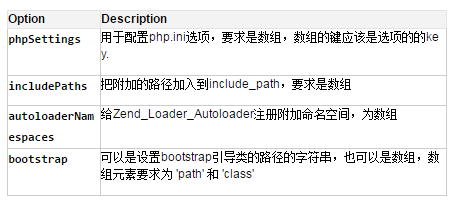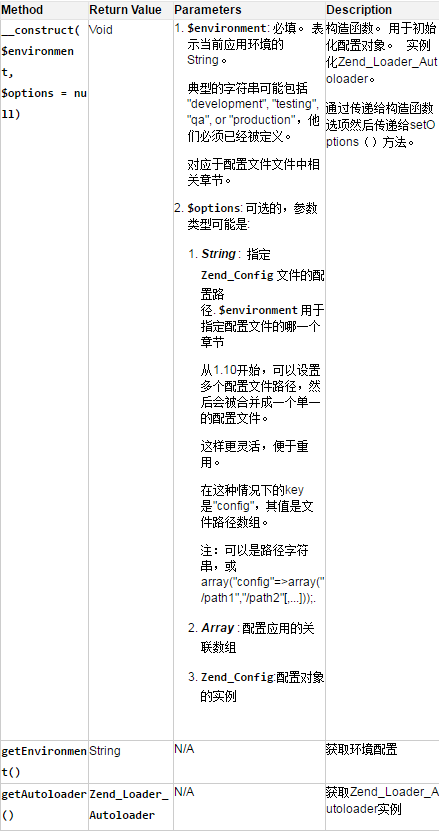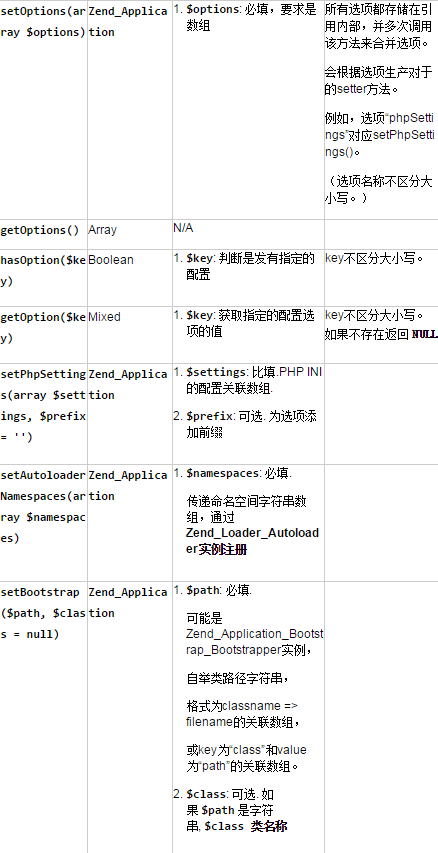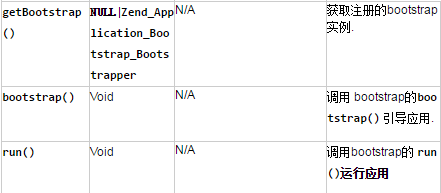Ausführliche Erläuterung der Anwendungsnutzungsbeispiele im Zend Framework-Tutorial
- 高洛峰Original
- 2016-12-27 14:19:021338Durchsuche
Das Beispiel in diesem Artikel beschreibt die Anwendungsnutzung des Zend Framework-Tutorials. Teilen Sie es als Referenz mit allen. Die Details lauten wie folgt:
Zend_Application ist die Kernkomponente von Zend Framework. Zend_Application stellt grundlegende Funktionen für Zend Framework-Anwendungen bereit und ist der Einstiegspunkt des Programms. Seine Hauptfunktionen sind zwei: Laden und Konfigurieren der PHP-Umgebung (einschließlich automatischem Laden) und Booten der Anwendung.
Typischerweise wird der Zend_Application-Konstruktor über Konfigurationsoptionen konfiguriert, er kann aber auch vollständig mithilfe einer benutzerdefinierten Methode konfiguriert werden. Nachfolgend finden Sie zwei Anwendungsfälle.
Zend_Application-Konfigurationsoptionen
Konstruktor:
/**
* Constructor
*
* Initialize application. Potentially initializes include_paths, PHP
* settings, and bootstrap class.
*
* @param string $environment
* @param string|array|Zend_Config $options String path to configuration file, or array/Zend_Config of configuration options
* @throws Zend_Application_Exception When invalid options are provided
* @return void
*/
public function __construct($environment, $options = null)
{
$this->_environment = (string) $environment;
require_once 'Zend/Loader/Autoloader.php';
$this->_autoloader = Zend_Loader_Autoloader::getInstance();
if (null !== $options) {
if (is_string($options)) {
$options = $this->_loadConfig($options);
} elseif ($options instanceof Zend_Config) {
$options = $options->toArray();
} elseif (!is_array($options)) {
throw new Zend_Application_Exception('Invalid options provided; must be location of config file, a config object, or an array');
}
$this->setOptions($options);
}
}Zend_Application-Konfigurationsmethode
1. Konfigurationsdatei verwenden




// Create application, bootstrap, and run
$application = new Zend_Application(
APPLICATION_ENV,
APPLICATION_PATH . '/configs/application.ini'
);
$application->bootstrap()
->run();Quellcode<?php
class Zend_Application
{ /**
* Constructor
*
* Initialize application. Potentially initializes include_paths, PHP
* settings, and bootstrap class.
*
* @param string $environment
* @param string|array|Zend_Config $options String path to configuration file, or array/Zend_Config of configuration options
* @throws Zend_Application_Exception When invalid options are provided
* @return void
*/
public function __construct($environment, $options = null)
{
$this->_environment = (string) $environment;
require_once 'Zend/Loader/Autoloader.php';
$this->_autoloader = Zend_Loader_Autoloader::getInstance();
if (null !== $options) {
if (is_string($options)) {
$options = $this->_loadConfig($options);
} elseif ($options instanceof Zend_Config) {
$options = $options->toArray();
} elseif (!is_array($options)) {
throw new Zend_Application_Exception('Invalid options provided; must be location of config file, a config object, or an array');
}
$this->setOptions($options);
}
}
/**
* Retrieve current environment
*
* @return string
*/
public function getEnvironment()
{
return $this->_environment;
}
/**
* Retrieve autoloader instance
*
* @return Zend_Loader_Autoloader
*/
public function getAutoloader()
{
return $this->_autoloader;
}
/**
* Set application options
*
* @param array $options
* @throws Zend_Application_Exception When no bootstrap path is provided
* @throws Zend_Application_Exception When invalid bootstrap information are provided
* @return Zend_Application
*/
public function setOptions(array $options)
{
if (!empty($options['config'])) {
if (is_array($options['config'])) {
$_options = array();
foreach ($options['config'] as $tmp) {
$_options = $this->mergeOptions($_options, $this->_loadConfig($tmp));
}
$options = $this->mergeOptions($_options, $options);
} else {
$options = $this->mergeOptions($this->_loadConfig($options['config']), $options);
}
}
$this->_options = $options;
$options = array_change_key_case($options, CASE_LOWER);
$this->_optionKeys = array_keys($options);
if (!empty($options['phpsettings'])) {
$this->setPhpSettings($options['phpsettings']);
}
if (!empty($options['includepaths'])) {
$this->setIncludePaths($options['includepaths']);
}
if (!empty($options['autoloadernamespaces'])) {
$this->setAutoloaderNamespaces($options['autoloadernamespaces']);
}
if (!empty($options['autoloaderzfpath'])) {
$autoloader = $this->getAutoloader();
if (method_exists($autoloader, 'setZfPath')) {
$zfPath = $options['autoloaderzfpath'];
$zfVersion = !empty($options['autoloaderzfversion'])
? $options['autoloaderzfversion']
: 'latest';
$autoloader->setZfPath($zfPath, $zfVersion);
}
}
if (!empty($options['bootstrap'])) {
$bootstrap = $options['bootstrap'];
if (is_string($bootstrap)) {
$this->setBootstrap($bootstrap);
} elseif (is_array($bootstrap)) {
if (empty($bootstrap['path'])) {
throw new Zend_Application_Exception('No bootstrap path provided');
}
$path = $bootstrap['path'];
$class = null;
if (!empty($bootstrap['class'])) {
$class = $bootstrap['class'];
}
$this->setBootstrap($path, $class);
} else {
throw new Zend_Application_Exception('Invalid bootstrap information provided');
}
}
return $this;
}
/**
* Retrieve application options (for caching)
*
* @return array
*/
public function getOptions()
{
return $this->_options;
}
/**
* Is an option present?
*
* @param string $key
* @return bool
*/
public function hasOption($key)
{
return in_array(strtolower($key), $this->_optionKeys);
}
/**
* Retrieve a single option
*
* @param string $key
* @return mixed
*/
public function getOption($key)
{
}
/**
* Merge options recursively
*
* @param array $array1
* @param mixed $array2
* @return array
*/
public function mergeOptions(array $array1, $array2 = null)
{
if (is_array($array2)) {
foreach ($array2 as $key => $val) {
if (is_array($array2[$key])) {
$array1[$key] = (array_key_exists($key, $array1) && is_array($array1[$key]))
? $this->mergeOptions($array1[$key], $array2[$key])
: $array2[$key];
} else {
$array1[$key] = $val;
}
}
}
return $array1;
}
/**
* Set PHP configuration settings
*
* @param array $settings
* @param string $prefix Key prefix to prepend to array values (used to map . separated INI values)
* @return Zend_Application
*/
public function setPhpSettings(array $settings, $prefix = '')
{
foreach ($settings as $key => $value) {
$key = empty($prefix) ? $key : $prefix . $key;
if (is_scalar($value)) {
ini_set($key, $value);
} elseif (is_array($value)) {
$this->setPhpSettings($value, $key . '.');
}
}
return $this;
}
/**
* Set include path
*
* @param array $paths
* @return Zend_Application
*/
public function setIncludePaths(array $paths)
{
$path = implode(PATH_SEPARATOR, $paths);
set_include_path($path . PATH_SEPARATOR . get_include_path());
return $this;
}
/**
* Set autoloader namespaces
*
* @param array $namespaces
* @return Zend_Application
*/
public function setAutoloaderNamespaces(array $namespaces)
{
$autoloader = $this->getAutoloader();
foreach ($namespaces as $namespace) {
$autoloader->registerNamespace($namespace);
}
return $this;
}
/**
* Set bootstrap path/class
*
* @param string $path
* @param string $class
* @return Zend_Application
*/
public function setBootstrap($path, $class = null)
{
// setOptions() can potentially send a null value; specify default
// here
if (null === $class) {
$class = 'Bootstrap';
}
if (!class_exists($class, false)) {
require_once $path;
if (!class_exists($class, false)) {
throw new Zend_Application_Exception('Bootstrap class not found');
}
}
$this->_bootstrap = new $class($this);
if (!$this->_bootstrap instanceof Zend_Application_Bootstrap_Bootstrapper) {
throw new Zend_Application_Exception('Bootstrap class does not implement Zend_Application_Bootstrap_Bootstrapper');
}
return $this;
}
/**
* Get bootstrap object
*
* @return Zend_Application_Bootstrap_BootstrapAbstract
*/
public function getBootstrap()
{
if (null === $this->_bootstrap) {
$this->_bootstrap = new Zend_Application_Bootstrap_Bootstrap($this);
}
return $this->_bootstrap;
}
/**
* Bootstrap application
*
* @param null|string|array $resource
* @return Zend_Application
*/
public function bootstrap($resource = null)
{
$this->getBootstrap()->bootstrap($resource);
return $this;
}
/**
* Run the application
*
* @return void
*/
public function run()
{
$this->getBootstrap()->run();
}
/**
* Load configuration file of options
*
* @param string $file
* @throws Zend_Application_Exception When invalid configuration file is provided
* @return array
*/
protected function _loadConfig($file)
{
$environment = $this->getEnvironment();
$suffix = pathinfo($file, PATHINFO_EXTENSION);
$suffix = ($suffix === 'dist')
? pathinfo(basename($file, ".$suffix"), PATHINFO_EXTENSION)
: $suffix;
switch (strtolower($suffix)) {
case 'ini':
$config = new Zend_Config_Ini($file, $environment);
break;
case 'xml':
$config = new Zend_Config_Xml($file, $environment);
break;
case 'json':
$config = new Zend_Config_Json($file, $environment);
break;
case 'yaml':
case 'yml':
$config = new Zend_Config_Yaml($file, $environment);
break;
case 'php':
case 'inc':
$config = include $file;
if (!is_array($config)) {
throw new Zend_Application_Exception('Invalid configuration file provided; PHP file does not return array value');
}
return $config;
break;
default:
throw new Zend_Application_Exception('Invalid configuration file provided; unknown config type');
}
return $config->toArray();
}
}Ich hoffe, dieser Artikel wird für alle hilfreich sein, die sich mit PHP-Programmierung befassen. Ausführlichere Erläuterungen zu Anwendungsnutzungsbeispielen in Zend Framework-Tutorials und verwandten Artikeln finden Sie auf der chinesischen PHP-Website! 
